News
-
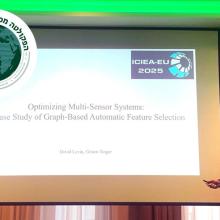
Greetings from Munich
David Levin, a PhD student of Prof. Gonen Singer, attended the annual ICIEA conference on industrial engineering. Levin presented an algorithm that improves the efficiency of multi-sensor systems and won the Best Paper Presentation award
-
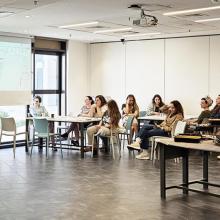
Shengineers: Woman's Day at the Faculty of Engineering
In celebration of Women’s Day, the Faculty of Engineering held an event for female graduate and postgraduate students with discussion groups on networking, industry ties, and work-life balance
-
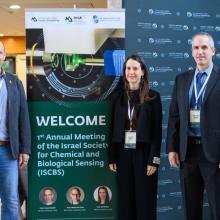
The First Annual Conference of the Israeli Society for Chemical and Biological Sensing (ISBCS)
The conference, initiated by the society’s founders among which is Prof. Amos Danielli, was attended by leading researchers in the field of biomedicine
-
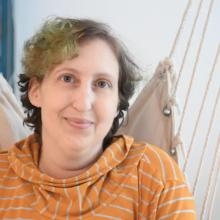
“Death has a mystery to it, and I believe I will feel liberated”
Dr. Noa Alon completed her PhD in bioengineering right here at the Faculty of Engineering and made a career change to scientific illustration before being diagnosed with cancer four years ago. Last month she passed away – but she did it on her own terms
-
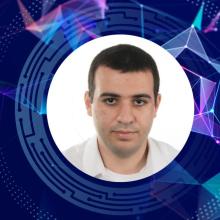
Innovative Solution to a Classic Computer Graphics Problem
PhD student Guy Fargion of Prof. Ofir Weber’s research group developed an algorithm that uses neural networks to solve the problem of flattening 3D surfaces onto 2D planes. His paper was accepted for presentation at a conference and for publication by a leading journal
-
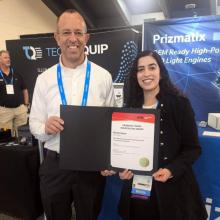
PhD Student Michal Katan Wins Young Investigator Award
Katan, a member of Prof. Dror Fixler’s lab, won the title at SPIE’s Photonics West 2025 conference. In her research, she is developing an optical sensor for measuring physiological parameters
-
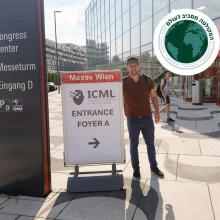
Greetings from Vienna
Jonathan Svirsky, a PhD student of Dr. Ofir Lindenbaum’s, attended ICLM, a prestigious annual conference in the realm of machine learning. He presented his research on sparsity—information representation in neural networks.
-
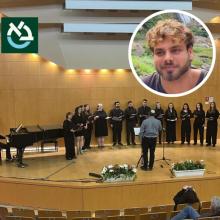
A Moving Concert at the Faculty of Engineering in Honor of Alon Ohel
The seventh concert in the Engineers, “Musicians, and in Between” series was dedicated to Alon Ohel, a gifted musician being held hostage in Gaza. The event, orchestrated by Prof. Alex Fish, included two lectures. Among the speakers were Alon’s brother, Ronen Ohel, and Efrat Mor, the manager of the music library at Bar-Ilan and the aunt of Eitan Mor who is also being held hostage in Gaza.
The event, directed by Prof. Alexander Fish and produced by Dr. Efrat Orbach, included two fascinating lectures: Yehuda Rodin discussed the question “Can an orchestra play without a conductor?” and Dr. Assaf Suberry presented his research, “Intergenerational Synchrony and Its Effect on Bonding and Group Closeness among Young and Older Adults.”
The musical portion included a performance by the Bar-Ilan chorus, conducted by Dr. Avi Bar-Eitan, pianist Avital Fighel, and musical groups managed by Dr. Uri Jacob.
This special, moving event that combined research, music, and a message of human bonding, was a rousing success.
-
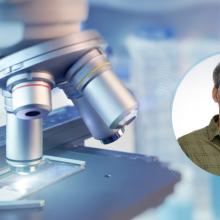
Dr. Shahar Alon Featured in “Nature”
Dr. Shahar Alon was interviewed by Nature about expansion microscopy (ExM), a technique he uses to biopsy cancer tissues to reveal how gene activity patterns shift when immune cells and tumor cells meet
-
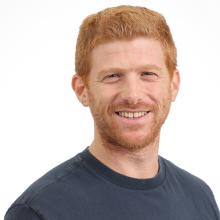
Introducing Dr. Amir Weiss
Dr. Weiss joined the electrical engineering program’s communications track. He likes the way mathematics describes problems of extracting information from observations, and works on solving these problems in areas such as communications, localization, and compression for estimation purposes using classical and modern tools such as machine learning
-
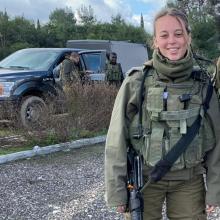
“A day with a goal achieved is a good day”
Meet Ron Shalev, second-year data engineering student, reserve logistics officer, October 7th survivor and Otef evacuee. “I am eternally appreciative of your mission, I know first-hand how difficult it is,” she tells her fellow students on reserve duty
-
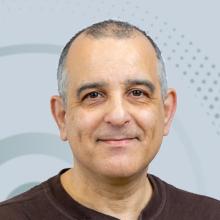
Prof. Amir Leshem’s Newest Appointment
Prof. Leshem was invited to serve on the IEEE Signal Processing Society’ Fellow Evaluation Committee. He became a Fellow three years ago in recognition of his contribution to the field of multi-channel and multi-agent signal processing
-
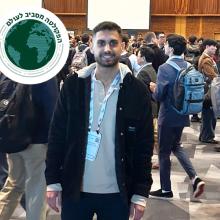
Hi from Vancouver
Daniel Omer, a master’s student of Dr. Or Sheffet, attended the NeurIPS conference on AI and computational neuroscience theory in Vancouver where he presented a paper on the link between differential privacy and hypotheses testing
-
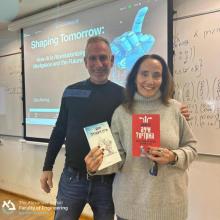
Faculty Guest: Founder & CEO Of High Tech Startups, Mr. Gal Almog
Gal specializes in AI-based technologies for HR and Talent Acquisition; Two of his Start-Up companies have made successful exits. He was invited by Dr. Hila Chalutz - Ben Gal to speak at the Faculty of Engineering about how AI is transforming the Business World
-
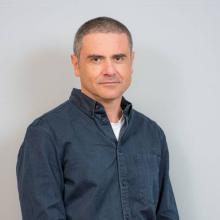
Prof. Ze’ev Zalevsky Wins SPIE’s Gabor Award
This year’s winner of the SPIE’s Gabor award goes to Prof. Ze’ev Zalevsky for his significant contribution to the field of holography and diffractive optics.



